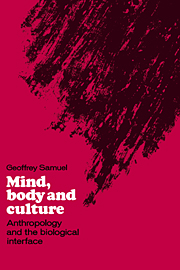Book contents
- Frontmatter
- Contents
- Preface
- 1 New paradigms and modal states
- 2 A natural science of society
- 3 Starting points I
- 4 Starting points II
- 5 Interpreting the flow
- 6 The multimodal framework
- 7 The Ndembu modal state repertoire
- 8 Sociocentric modal states
- 9 Shamanic mechanisms
- 10 The growth of the clerical approach
- 11 Technical and transformational mechanisms
- 12 Mind, body and culture
- Notes
- References
- Index
8 - Sociocentric modal states
Published online by Cambridge University Press: 04 September 2009
- Frontmatter
- Contents
- Preface
- 1 New paradigms and modal states
- 2 A natural science of society
- 3 Starting points I
- 4 Starting points II
- 5 Interpreting the flow
- 6 The multimodal framework
- 7 The Ndembu modal state repertoire
- 8 Sociocentric modal states
- 9 Shamanic mechanisms
- 10 The growth of the clerical approach
- 11 Technical and transformational mechanisms
- 12 Mind, body and culture
- Notes
- References
- Index
Summary
The treatment of the Ndembu in chapter 7 was not intended to imply that the Ndembu are a ‘typical’ society, or even a typical small-scale, preliterate, low technology society. Its purpose was simply to demonstrate that the MMF provides a convenient and practicable language for describing at least some aspects of one human society. At the same time I introduced the theme of societal mechanisms for creating and maintaining modal states, along with a number of related issues. In this chapter I shall follow up some of these issues further through shorter discussions of several other societies.
To begin with, let us return to the Ndembu analysis. Note the way in which the multimodal framework, when applied to the Ndembu material, groups together the ‘individual’, ‘group’ and ‘societal’ aspects of Ndembu rituals and their symbolism. It is not coincidental that this grouping appears to make so much sense when applied to the Ndembu data. It corresponds to what Turner himself was doing in his classic studies. Turner, in his writings of the 1960s, was struggling against the nature of the categories available to him at that time. His works represent a significant attempt to fit together what those categories separate.
This, it seems to me, is the point of Turner's emphasis on the ‘bipolar’ nature of Ndembu ritual symbols, a theme explored at length in his writings of the early 1960s.
- Type
- Chapter
- Information
- Mind, Body and CultureAnthropology and the Biological Interface, pp. 93 - 105Publisher: Cambridge University PressPrint publication year: 1990



